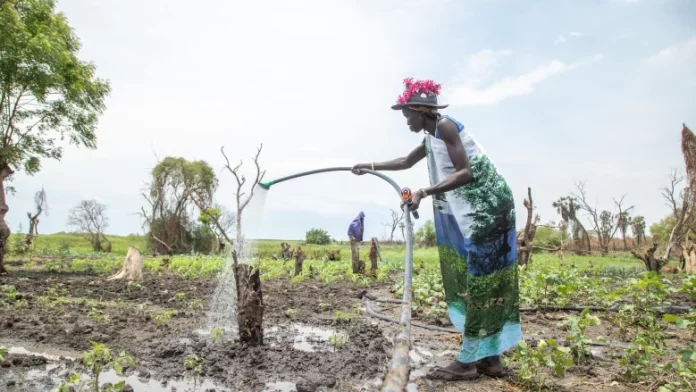
Some two World Bank funded agricultural projects focused on farmers’ capacity building through promoting knowledge, skills, access to inputs and other solutions are uplifting livelihoods of vulnerable communities in South Sudan.
The projects, Resilient Agricultural Livelihoods Project (RALP) and Emergency Locust Response Project (ELRP) which were started in 2021 running through 2026 are addressing immediate and long term development needs and improving agricultural productivity among the farming communities.
Amid growing poverty and food insecurity in the youngest African nation caused by excessive floods, economic volatility, and sub-national conflicts the projects are now offering a ray of hope and a chance for many households to boost their living standards.
So far, over 52,000 households facing acute food insecurity are benefiting from climate-smart agricultural and technology while more than 184,000 vulnerable households are receiving assistance to protect and restore livelihoods and food security.
Resilient Agricultural Livelihoods Project (RALP)
According to Achol Akueth Deng, 45, one of the beneficiaries of RALP, the project has improved her life and that of her family. This is besides 52,224 farming households facing acute food insecurity who have also benefited from the project through climate-smart agricultural inputs (seeds, maize, sorghum, groundnuts, cowpeas, vegetables) and technology to increase production.
“With the support we received from the project, I am now living a happy life since I started growing some vegetables for household consumption and selling the excess for money to buy some basic needs for my family and to pay the school fees of my children,” said the resident of Kolnyang Payam in Bor County, and a member of the Tuidu farmers’ group.
Sowila Mangu Ali, 38, says she has benefited from foundation seeds provided by the RALP.
“With the seeds we are producing, farmers will be ready to cultivate large farms/lands and plant crops and vegetables in both dry and main seasons at the right time and produce larger quantities for both home consumption and markets because there is a ready market,” said the mother of five and a member of the Momoi Seed Production for Market Cooperative in Wau County.
Emergency Locust Response Project (ELRP)
On the other hand, ELRP which focuses on responding to threats posed by the desert locust outbreak, protecting, and restoring livelihoods and food security, and strengthening systems for preparedness has benefited up to 184,176 vulnerable households in nine counties in the five states of Eastern Equatoria, Central Equatoria, Jonglei, and Northern Bahr el Ghazal.
One of the locals who had benefited from the project is 45-year-old Awel Borong Deng who has helped in rehabilitating three-kilometer Ritnhom access road in Bor County earning $40.5 per month.
The Ritnhom access road leads to a seasonal cattle camp, which is of major economic and social value to the community and provides convenient access to farming communities in the area.
In Kapoeta East, Kiden Juan, a mother of eight received training on seedling and vegetable production.
“With the knowledge from the training, I will also train other members of my community who have not been fortunate enough to receive these skills I have acquired,” said Kiden.
ELRP has also invested in building the capacity of the government, both at the national and state level in pest surveillance and control operation measures.
“The agriculture sector is the backbone of South Sudan. It contributes significantly to the Gross Domestic Product of this country and employs over 80% of this country’s population. To this effect, the government has declared a country-wide war against hunger and poverty by developing the Comprehensive Agriculture Master Plan (CAMP) and Irrigation Development Master Plan (IDMP), which outline the priority investment areas and roadmap to agriculture sector transformation in South Sudan,” said Honorable Josephine Joseph Lagu, South Sudan’s national Minister of Agriculture and Food Security.
In her first visit to South Sudan in March 2023, the World Bank Vice President for Eastern and Southern Africa, Victoria Kwakwa had an opportunity to visit Bor town in Jonglei State to assess and get firsthand information on the World Bank resilient agricultural project sites.
She was accompanied by key ministers from the economic cluster, the Minister of Agriculture and Food Security, Honorable Josephine Joseph Lagu, Minister of Livestock and Fisheries, Honorable Onyoti Adigo Nyikech, and the former Minister of Finance and Planning, Honorable Dier Tong Ngor.
The RALP has received an additional financing of $30 million from IDA that will be channeled towards fighting the food insecurity generated by the four years of devastating, record floods in South Sudan. Part of the additional financing will also fund livestock and fisheries projects in targeted areas in South Sudan.







